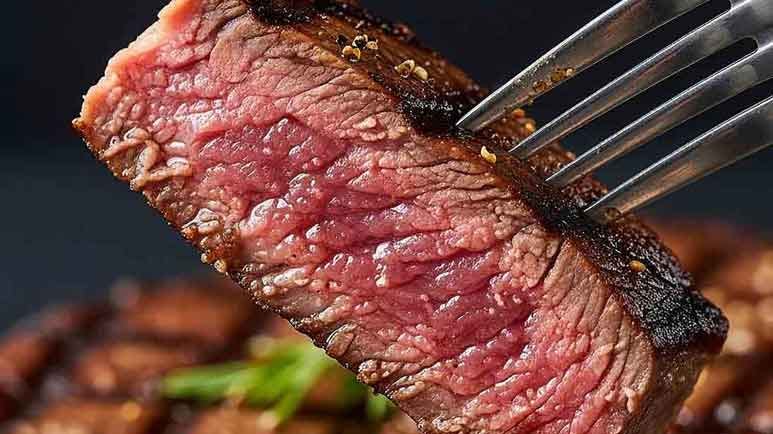How Eating Red Meat the Right Way Boosts Brain and Microbiome Health
Description
STORY AT-A-GLANCE
Red meat, when eaten as part of a nutrient-rich, whole-food diet, supports brain function and gut health by supplying hard-to-get nutrients like vitamin B12, zinc, selenium, choline, and taurine that enhance mitochondrial energy and mental clarity
People who included moderate amounts of red meat in a high-quality diet had higher brain-supporting nutrient levels and greater gut microbial diversity — key indicators of resilience and emotional well-being
Processed meats such as bacon and sausage are a different story; even half a slice daily was linked to faster cognitive aging, higher dementia risk, and damage caused by nitrosamine formation from nitrites
Choosing grass fed and finished red meat, cooking it gently, and pairing it with antioxidant-rich vegetables maximizes nutrients while minimizing oxidative stress and inflammation
Collagen-rich cuts like oxtail, shank, or bone broth balance the amino acid profile of muscle meat, strengthening connective tissue, improving sleep, and reducing inflammation for lasting vitality

For decades, red meat has been a lightning rod in nutrition debates — praised for its dense nutrition yet criticized for its supposed role in chronic disease. But the conversation is evolving. Researchers are beginning to look beyond single foods and instead examine how overall diet quality shapes health outcomes.
It turns out the context in which you eat red meat — what it’s paired with, how it’s prepared, and the rest of your diet — matters, perhaps far more than whether you eat it at all. Your brain and gut are at the center of this discussion. Both rely on a steady supply of specific nutrients, including B vitamins, minerals, and amino acids that support neurotransmitter balance, mitochondrial function, and intestinal integrity.
When those nutrients are lacking, fatigue, brain fog, low mood, and digestive changes often follow. Rather than blaming one food, researchers are asking a more important question: how can diet composition strengthen the gut-brain connection and protect long-term cognitive health?
This new line of inquiry reframes red meat’s role within a balanced diet — shifting the focus from restriction to balance and nutrient synergy. What you’ll discover is that quality, preparation, and variety determine whether red meat harms or heals. Understanding that difference is key to building meals that enhance brain clarity, gut function, and overall resilience.
Including Red Meat in a High-Quality Diet Improves Brain Nutrient Levels and Gut Health
Research published in Scientific Reports evaluated 3,643 adults from the American Gut Project to determine whether eating red meat — within both high- and low-quality diets — influenced nutrients central to brain health, gut microbiome diversity, and mental health outcomes.1 Researchers compared those who ate red meat with those who didn’t, while also controlling for whether their diets were nutrient-rich or poor overall.
Participants with the healthiest diets who ate red meat showed the best nutritional profiles — Among those consuming balanced, nutrient-dense diets, red meat consumers had greater intakes of brain-supporting nutrients — vitamin B12, zinc, selenium, calcium, and choline — than those who avoided meat.
<label class="hide-text" contenteditable="false">Text within this block will maintain its original spacing when published</label>These nutrients are key to oxygen delivery, nerve communication, DNA repair, and neurotransmitter production.
<label class="hide-text" contenteditable="false">Text within this block will maintain its original spacing when published</label>For instance, vitamin B12 helps regulate homocysteine, an amino acid linked to depression and cognitive decline when elevated.2 Red meat inclusion contributed to this benefit by significantly boosting B12 adequacy. Zinc and selenium are powerful antioxidants that protect neurons from oxidative stress, while choline helps build cell membranes and supports memory function.
A balanced diet mattered more than avoiding red meat entirely — Individuals who scored high on diet quality, regardless of whether they ate meat, had lower odds of depression, bipolar disorder, and post-traumatic stress disorder (PTSD). This finding shows that it isn’t red meat alone that shapes mental health — it’s the broader dietary pattern.
<label class="hide-text" contenteditable="false">Text within this block will maintain its original spacing when published</label>Those consuming low-quality diets, with or without meat, were more likely to have poorer health outcomes and higher body mass indexes (BMIs), suggesting that dietary balance outweighs strict food exclusion.
Red meat was linked to better gut microbial diversity, a marker of resilience — Gut microbial diversity refers to the variety of bacteria living in your intestines. More diversity usually means better digestion, stronger immune function, and greater resistance to inflammation. People eating high-quality diets that included red meat had the richest and most balanced microbiota profiles.
<label class="hide-text" contenteditable="false">Text within this block will maintain its original spacing when published</label>In contrast, those eating poor-quality diets without red meat showed the lowest microbial diversity, which is often linked to fatigue, anxiety, and metabolic dysfunction.
The study identified specific gut bacteria linked to better mental and metabolic health — Red meat eaters with high diet quality had more bacterial species associated with stable metabolism and lower inflammation.
<label class="hide-text" contenteditable="false">Text within this block will maintain its original spacing when published</label>Meanwhile, non-meat eaters in the same category had more species tied to carbohydrate fermentation and fiber digestion. Importantly, the study found that neither group showed harmful shifts or dysbiosis, meaning red meat inclusion did not disrupt the gut’s microbial balance when part of a wholesome diet.
Nutrient levels improved safely without exceeding upper limits — Despite higher micronutrient intake






